
CURRENT SCIENCE
Scope & Guideline
Illuminating Pathways in Diverse Scientific Disciplines
Introduction
Aims and Scopes
- Environmental Science and Sustainability:
The journal publishes research related to environmental conservation, climate change impacts, and sustainable practices in agriculture and natural resource management. - Biodiversity and Conservation:
Research focusing on the preservation of biodiversity, including studies on endemic species, their habitats, and the effects of anthropogenic activities on ecosystems. - Agricultural Innovations and Food Security:
CURRENT SCIENCE emphasizes research on agricultural practices, crop management, food security, and the integration of technology in farming. - Health Sciences and Medicine:
The journal includes studies on public health, disease management, and the use of traditional medicine systems in addressing health challenges. - Geosciences and Earth System Sciences:
Research on geological formations, mineralogy, and the impact of climate change on geological structures, alongside studies on disaster management and risk assessment. - Technological Advancements in Science:
The journal covers innovative methodologies and technologies in various scientific fields, including biotechnology, nanotechnology, and computational modeling.
Trending and Emerging
- Climate Change Adaptation and Mitigation:
A growing number of studies focus on strategies for adapting to climate change impacts, particularly in relation to agriculture, water resources, and biodiversity conservation. - Public Health and Pandemics:
Research addressing public health challenges, especially in light of the COVID-19 pandemic, has surged, with a focus on vaccine development, healthcare systems, and disease management. - Technological Integration in Agriculture:
There is an increasing emphasis on the role of technology, such as AI and machine learning, in enhancing agricultural productivity and sustainability. - Sustainable Resource Management:
Emerging themes include innovative approaches to managing natural resources sustainably, particularly in the context of water management and soil health. - Biodiversity and Ecosystem Services:
The importance of biodiversity in maintaining ecosystem services has gained traction, with studies exploring the interconnections between species conservation and human well-being.
Declining or Waning
- Traditional Agricultural Practices:
There has been a noticeable decrease in studies focusing solely on traditional agricultural practices as researchers increasingly explore modern, technology-driven approaches. - Historical and Cultural Studies:
The publication of papers centered on historical or cultural aspects of science has diminished, possibly as the journal pivots towards more applied and contemporary scientific research. - Basic Environmental Research:
While environmental issues remain a key focus, the basic research aspect concerning environmental science appears to be waning in favor of applied research that directly addresses current socio-economic challenges.
Similar Journals

Vietnam Journal of Earth Sciences
Exploring Earth's Mysteries, Empowering Scientific ProgressThe Vietnam Journal of Earth Sciences, ISSN 0866-7187, is a premier publication from the Publishing House Science and Technology based in Viet Nam, dedicated to fostering advancements in the field of Earth and Planetary Sciences. Operating under a Q2 ranking in the 2023 category of Earth and Planetary Sciences (miscellaneous) and positioned at Rank #62 out of 195 in its general category on Scopus, this journal serves as a critical platform for researchers, professionals, and students seeking to disseminate and engage with high-quality scientific findings. Despite being part of the non-open access model, the journal is committed to providing compelling content, encompassing a range of topics from geological hazards to environmental sustainability, ensuring its relevance and contribution to both local and international scientific communities. With coverage that spans from 2018 to 2024, the journal is poised to continue its role in addressing pressing Earth science issues and fostering collaborations among scholars in an increasingly interconnected world.
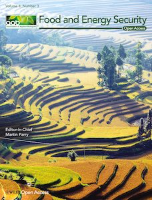
Food and Energy Security
Pioneering Research at the Intersection of Food and EnergyFood and Energy Security, an esteemed journal published by WILEY, is dedicated to advancing the fields of food science, agriculture, and renewable energy. Since its inception in 2012, this open-access journal has provided a platform for groundbreaking research and innovative practices that address global challenges related to food production and energy sustainability. With an impressive impact factor reflected in its Q1 quartile rankings across notable categories such as Agronomy and Crop Science and Food Science, this journal is instrumental for researchers and practitioners alike who are focused on enhancing food security and promoting sustainable energy solutions. The journal's scope encompasses multidisciplinary approaches and encourages submissions that explore the intersection of food systems and energy dynamics, ensuring relevance in the evolving landscape of environmental science and policy. By offering open access to its publications, Food and Energy Security commits to making vital research accessible, fostering informed dialogue and collaboration among scholars, policymakers, and the agrifood industry worldwide.
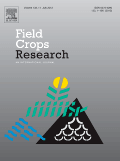
FIELD CROPS RESEARCH
Pioneering Discoveries in Agronomy and Soil ScienceFIELD CROPS RESEARCH is a premier academic journal published by Elsevier, dedicated to advancing knowledge in the fields of Agronomy and Crop Science as well as Soil Science. Now in its 46th year of publication, this esteemed journal has established itself as a leading resource, holding a prestigious Q1 ranking in both the Agronomy and Soil Science categories, with a remarkable blend of rigorous peer-reviewed research and innovative findings. With a Scopus ranking of #27/406 in Agronomy and #20/159 in Soil Science, and a notable 93rd and 87th percentile respectively, FIELD CROPS RESEARCH plays a vital role in informing practices that drive sustainable agriculture and optimize crop production. Although not an open access journal, it remains highly accessible to the global research community and offers critical insights that influence policy and agricultural practices worldwide. Researchers, professionals, and students are encouraged to delve into this journal, as it continues to shape the future of field crop research through impactful studies and comprehensive reviews.
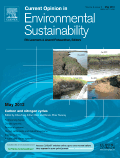
Current Opinion in Environmental Sustainability
Championing Collaboration in Sustainability ScienceCurrent Opinion in Environmental Sustainability, published by Elsevier Science Ltd, is a leading academic journal that specializes in exploring innovative strategies and emerging trends in environmental sustainability. With an impressive impact factor that reflects its esteemed position within the field, this journal is classified as Q1 in both the Environmental Science and Social Sciences categories for 2023, indicating its high-quality and influential contributions. The journal has been at the forefront of sustainability discussions since its inception in 2009 and continues to provide a platform for multidisciplinary research and critical analysis. As a key resource for researchers, professionals, and students alike, Current Opinion in Environmental Sustainability ensures open access to valuable insights while fostering collaboration and knowledge sharing across various domains. This journal not only serves to inform and inspire but also aims to address the pressing challenges of sustainability in our evolving world, making it an essential read for anyone engaged in environmental studies.
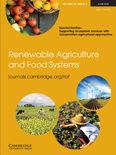
RENEWABLE AGRICULTURE AND FOOD SYSTEMS
Pioneering interdisciplinary approaches to food sustainability.RENEWABLE AGRICULTURE AND FOOD SYSTEMS, published by Cambridge University Press, is a leading open-access journal dedicated to the advancement of sustainability in agricultural practices and food systems. With an ISSN of 1742-1705 and an E-ISSN of 1742-1713, this journal spans the interdisciplinary fields of agronomy and food science, achieving a commendable Q2 ranking in both categories for 2023. As it continues to converge through the years from 2004 to 2024, the journal offers a platform for researchers, professionals, and students to disseminate transformative research that addresses the challenges of food security, resource management, and environmental impact. The journal’s significant impact is underscored by its Scopus rankings, situating it in the 77th percentile among agronomy and crop science publications, and the 67th percentile in food science. Since becoming fully open access in 2023, RENEWABLE AGRICULTURE AND FOOD SYSTEMS promotes wider accessibility to vital research findings, fostering collaboration and innovation in the pursuit of sustainable agricultural practices and food systems worldwide.
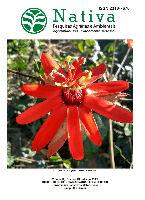
Nativa
Advancing sustainable practices in agricultural and biological sciences.Nativa, published by the Universidade Federal de Mato Grosso in Brazil, stands as a prominent open-access journal since 2013, dedicated to the dissemination of research across various domains of Agricultural and Biological Sciences. With its ISSN 2318-7670, Nativa aims to foster scholarly communication and collaboration among researchers and practitioners worldwide. The journal occupies notable positions within the Scopus rankings, with a Q3 classification in several categories, including Agricultural and Biological Sciences (miscellaneous) and Environmental Science (miscellaneous), while also holding a Q4 classification in areas such as Agronomy and Crop Science and Animal Science and Zoology. This positioning reflects its commitment to advancing knowledge and understanding crucial to sustaining and enhancing our natural resources. Nativa seeks to engage a diverse readership by providing a platform for innovative research, fostering interdisciplinary discourse, and addressing pressing environmental challenges and conservation efforts essential for sustainable development.

Journal of Agriculture and Environment for International Development
Innovating Strategies for Sustainable Agriculture and EnvironmentJournal of Agriculture and Environment for International Development, published by AGENZIA ITALIANA COOPERAZIONE SVILUPPO-ITALIAN DEV COOP AGENCY, is a vital platform advancing research at the intersection of agricultural practices, environmental sustainability, and international development. Since its inception, this Open Access journal has aimed to disseminate knowledge and innovative strategies that address global challenges in the agri-environment sector. With ISSN 2240-2802, this esteemed publication is situated in Italy and has maintained an unwavering commitment to accessibility since 2011, encouraging widespread engagement amongst researchers and practitioners. Although currently ranked in the Q4 quartile across various categories including Agricultural and Biological Sciences and Environmental Science, the journal is dedicated to covering crucial topics that contribute to sustainable development, thus serving as an invaluable resource for scholars and policymakers alike. The convergence years from 2016 to 2024 reflect the journal's adaptive approach to evolving global trends, ensuring its relevance in a rapidly changing academic landscape.

International Journal of Conservation Science
Innovating Strategies for Our Planet's FutureThe International Journal of Conservation Science, published by the Romanian Inventors Forum, is a premier, Open Access journal dedicated to advancing the field of conservation science since its foundation in 2010. With a strong emphasis on interdisciplinary research, the journal welcomes contributions that explore innovative methodologies and sustainable practices in conservation. Based in Romania, the journal boasts an impact factor that positions it as a leading voice in its field, reflected by its Q1 ranking in Conservation and notable placements within its categories in Scopus. With coverage spanning diverse areas from natural resource management to environmental education, the journal serves as a crucial platform for researchers, policymakers, and practitioners aiming to drive impactful conservation strategies globally. The International Journal of Conservation Science not only enhances the visibility of significant research but also promotes open dialogue and collaboration among professionals committed to preserving our natural heritage.

Agriculture-Basel
Empowering Agricultural Science Through Open AccessAgriculture-Basel is a prestigious, peer-reviewed journal published by MDPI, specializing in the dynamic fields of agronomy, crop science, food science, and plant science. Established in 2011, this open-access journal serves as a pivotal platform for disseminating innovative research and developments in agricultural practices and technologies. With its impressive impact factor and ranking within the top quartiles in key categories, including Q1 in Agronomy and Crop Science and Q2 in Food Science and Plant Science, the journal has garnered significant attention from the research community. Its current Scopus rankings reflect its influence and importance, with notable positions in agricultural and biological sciences. Aimed at researchers, professionals, and students in the agricultural sector, Agriculture-Basel is committed to fostering a deeper understanding of sustainable practices and advancements in the field. With an emphasis on accessibility, the journal ensures that its valuable content is freely available since its inception, making it a cornerstone resource for all those engaged in contemporary agricultural research and applications.

Nature Food
Advancing the Future of Food Science.Nature Food, an esteemed journal published by NATURE PORTFOLIO, stands at the forefront of research in Agronomy, Animal Science, and Food Science. With its E-ISSN 2662-1355 and a remarkable recognition of being ranked Q1 in three essential categories by Scopus in 2023, it is tailored for researchers, professionals, and students dedicated to the advancement of knowledge in these fields. Situated in the United Kingdom and extending its reach globally, the journal has displayed an impressive ranking, placing it in the top percentiles of Agricultural and Biological Sciences, highlighting its vital place in fostering innovative research and scholarly communication. The journal's scope encompasses a wide array of topics critical to food systems, sustainability, and agricultural practices, making it an invaluable resource for anyone looking to stay ahead in this dynamic area of study. With access options designed to enhance the visibility and dissemination of research findings, Nature Food is committed to promoting open dialogue and collaboration among the global academic community, driving forward our understanding of food security and environmental stewardship.